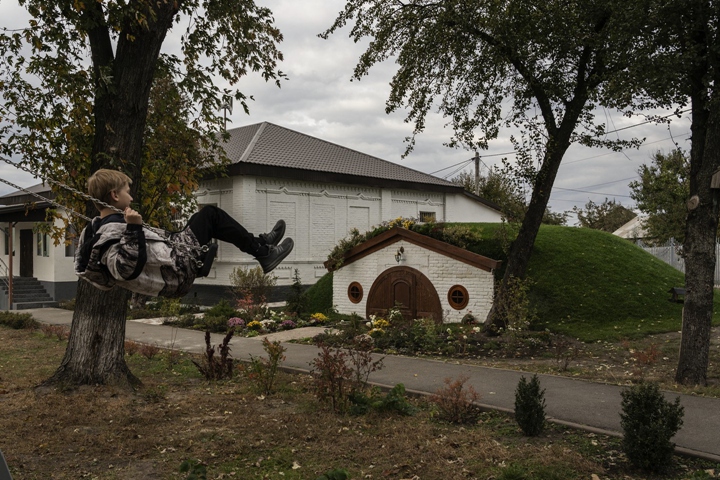Schooling in Wartime
Text and photos by Sandro Maddalena/Parallelozero
Abridged by Syharn Shen (沈思含)
Schooling in Wartime
Text and photos by Sandro Maddalena/Parallelozero
Abridged by Syharn Shen (沈思含)

In Chernihiv, lessons unfold in the safety of a school basement during an air raid alarm. Only schools that have sufficiently large basements can function regularly.
In early 2022, the Ukrainian educational landscape was dramatically altered as Russian forces launched a comprehensive attack on the country. This offensive, initiated hours before the school day on February 24, saw millions, including students and teachers, wake to the harrowing sounds of explosions and air raid sirens. This marked a profound interruption in education, exacerbated by the indiscriminate targeting of civilian infrastructure, including educational facilities, by Russian military actions. The early claims of targeting only military and strategic assets quickly unraveled as schools, kindergartens, and universities were hit, revealing the hollowness of Kremlin narratives.
The conflict's escalation further distressed the already challenged educational sector. Schools that remained standing were either vandalized or repurposed by military forces, complicating the continuation of educational activities. Notably, the basement of a school in Yadhine transformed into a detention center, tragically highlighting the dire consequences of the conflict on community spaces. Conversely, some educational facilities, like School No. 5 in Izium, became shelters, offering protection to civilians amidst the turmoil.

In Lviv's Patriotic-Military Education Center "Victory," children learn to assemble and use rifles.
By mid-March, Ukraine attempted to restore educational activities through distance learning amidst persistent security threats. This period saw the initiation of innovative projects, like an online kindergarten, aimed at mitigating the disruption to education. Despite initial optimism following the withdrawal of Russian forces from certain areas, the presence of mines, the threat of missile attacks, and damaged infrastructure posed significant obstacles to the resumption of in-person learning.
A comprehensive study later showed the extensive damage inflicted on the education system, revealing that an average of 22 schools faced attacks daily. The aftermath saw thousands of educational buildings repurposed for humanitarian efforts, further straining the educational infrastructure. The majority of educational activities thus transitioned online, with only a fraction of areas able to support hybrid or in-person formats.

A mural painted by Oleksandr Korban, famous Ukrainian street artist, adorns the external wall of a school in the Ukrainian capital of Kyiv.
In September 2022, a mere 41% of schools capable of meeting safety criteria resumed some form of in-person education. The scenario worsened as Russian forces adapted their strategy, targeting Ukraine's energy infrastructure, leading to widespread power outages that disrupted both traditional and online educational methods.
Despite these adversities, 2023 witnessed gradual improvements within the Ukrainian education system. Enhanced preparations, including a significant influx of electric generators and concerted efforts in repairing damaged buildings, marked a shift towards recovery. Initiatives like the demining of contaminated areas and the construction of standard shelters underscored a collective effort towards securing a safe educational environment. As a result, the capacity for attended education improved significantly, with over 70% of schools operating in some capacity.

At a school in Hostomel, Kyiv Region, a bomb shelter built with inspiration from a Hobbit house provides a comforting space for children, complete with a swing in the courtyard for moments of play.
However, disparities in educational access remain stark, especially in areas near active conflict zones. The situation in the Kharkiv region exemplifies these challenges, with only a small number of schools being renovated amidst constant threats. In response, Kharkiv's innovative "subway school" emerged as a beacon of resilience, offering a safe and conducive environment for learning despite the surrounding chaos. This initiative not only demonstrates the determination to maintain educational continuity but also serves as a model for similar efforts under crisis conditions.
The war in Ukraine has significantly affected its educational system, revealing both the challenges these institutions face during conflicts and the resilience within communities to maintain access to education. This period has seen the Ukrainian educational landscape navigate from disruption towards recovery, showcasing a strong dedication to learning and the resilient spirit of its people in the face of adversity.
Contact Us | Plan a Visit | Donate
8 Lide Road, Beitou 11259, Taipei, Taiwan
886-2-2898-9999
005741@daaitv.com
©Tzu Chi Culture and Communication Foundation
All rights reserved.
